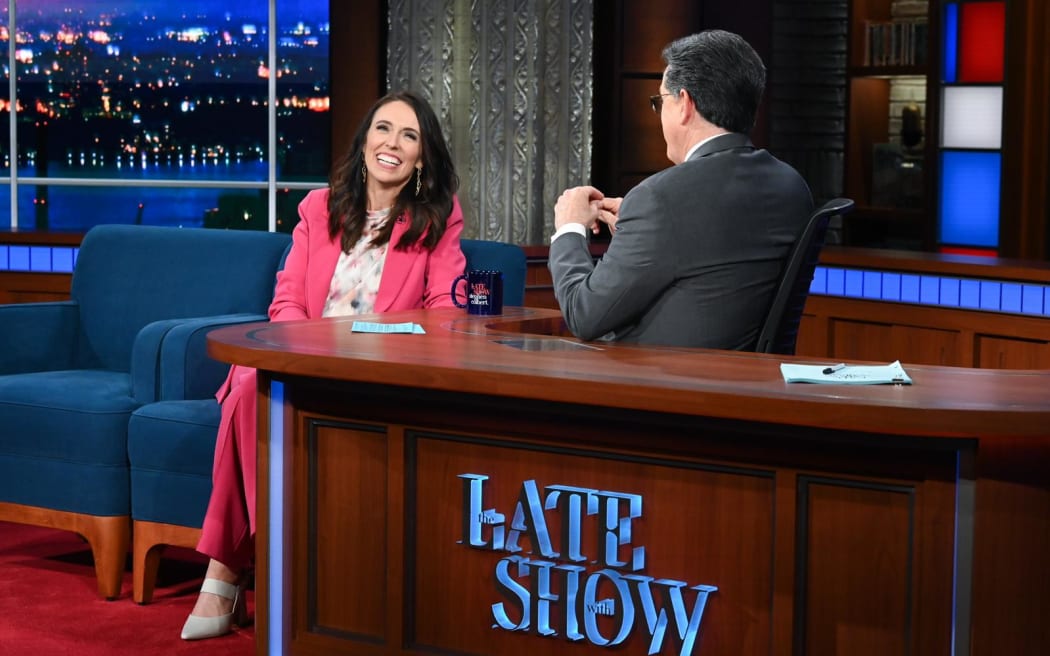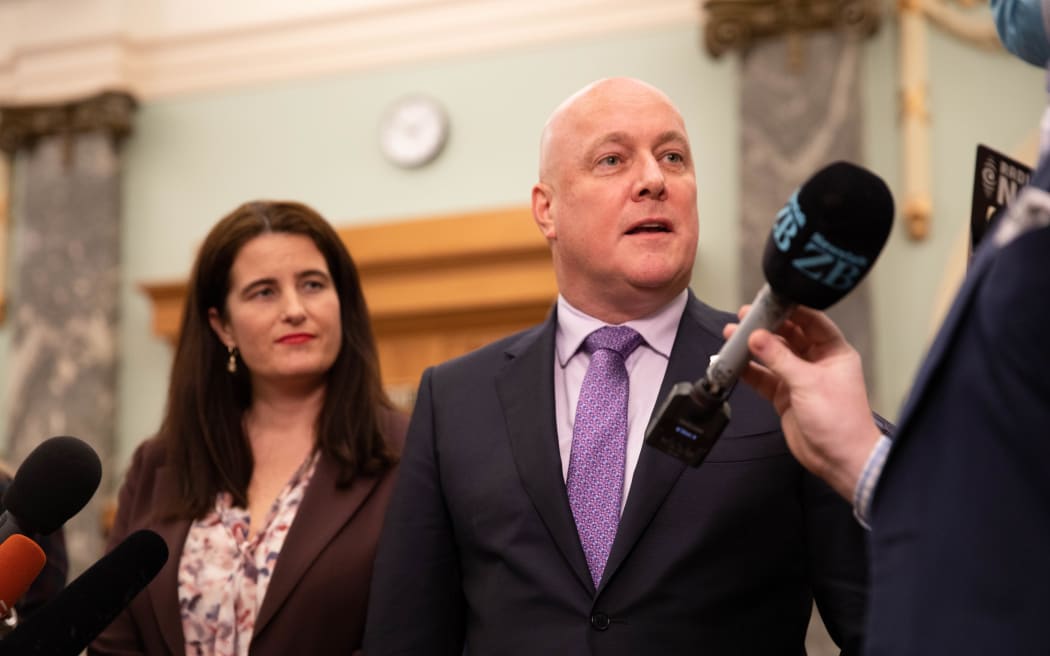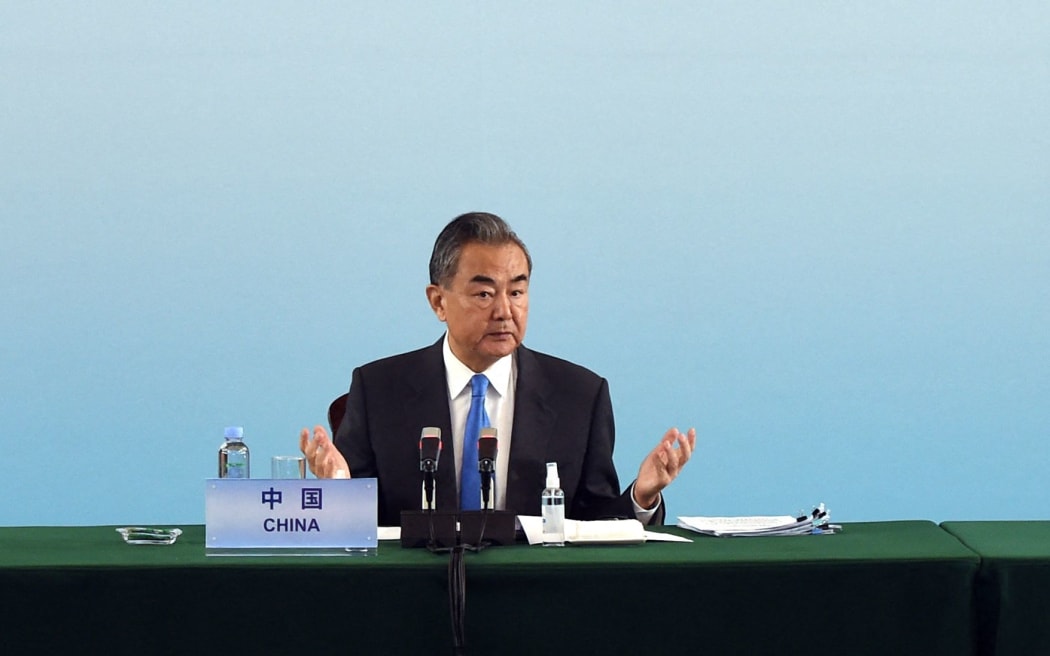Analysis – The prime minister swings through the US on her ‘back in business’ tour while back home opposition parties continue their relentless criticism of government spending. The change of government in Australia raises questions about how trans-Tasman relations will be affected and China is on the move in the South Pacific as it seeks to extend its influence in the region.
 Prime Minister Jacinda Ardern appearing on the Late Show during her US visit. Photo:
Prime Minister Jacinda Ardern appearing on the Late Show during her US visit. Photo:Prime Minister Jacinda Ardern began her United States tour this week with trade and tourism at the top of her agenda.
She’s leading a trade delegation that’s looking for opportunities and in New York they met with representatives from BlackRock, the world’s biggest investment fund reported to have assets worth $US10 trillion under its management.
Ardern met US travel editors, making sure they knew that New Zealand was open for business, and later said they had been very interested in the new New York to Auckland flights.
Her press conference after those events and following her meeting with UN Secretary-General Antonio Guterres is on RNZ’s website and political editor Jane Patterson is with the prime minister reporting on the tour, which takes in several cities.
The primary school massacre in Texas impacted on her visit. Gun control was an issue during her appearance on TV host Stephen Colbert’s Late Show.
In Washington Ardern met politicians from both parties – “speed meetings” as they were described – and was again questioned about New Zealand’s gun control laws.
Since the visit began there had been uncertainty over whether Ardern would meet President Joe Biden, but on Friday morning she announced arrangements had been tied down.
She would meet Biden and Vice President Kamala Harris in the White House on Tuesday.
It will be the highlight of her visit and it’s safe to assume Biden will want to talk to her about gun control after his emotional speech following the attack at the school where 19 children died.
Ardern was brimming with enthusiasm at her meetings and media appearances, highlighting the importance of face-to-face contact the business delegates had been able to achieve and the wide reach of her own meetings.
 National leader Christopher Luxon and his deputy Nicola Willis say the government is incapable of financial discipline. Photo: RNZ / Angus Dreaver
National leader Christopher Luxon and his deputy Nicola Willis say the government is incapable of financial discipline. Photo: RNZ / Angus DreaverBack home it was a different story.
There’s an adage politicians are familiar with: If you say something often enough, people start to believe it.
National’s leader Christopher Luxon is new to the game, but he’s certainly aiming to get his message across with a relentless focus on the cost of living and his accusations that government spending is fuelling inflation.
Finance Minister Grant Robertson has disputed that, saying if he didn’t spend the $11 billion earmarked for restructuring the health service it wouldn’t make any difference to inflation.
Luxon wraps his criticism into his claim that a lot of government spending is wasteful, and that Labour and Robertson in particular are “addicted to spending”.
On Wednesday he told Morning Report the government was incapable of financial discipline.
Asked what he would cut, Luxon cited the $327 million merger of TVNZ and RNZ, which he said was a solution looking for a problem.
He also criticised the $208m that was being spent on a firearms registry and $640m to help companies cut their emissions. He has previously said corporates should do it themselves.
National’s finance spokeswoman, Nicola Willis, is on the same page.
They’ve been hammering it for months and opinion polls have shown a significant rise in National’s support, so it’s likely to go on for a while yet.
ACT leader David Seymour is pushing the same message, and there was an interesting exchange when he appeared with economist Shamubeel Eaqub on a Newshub programme.
Seymour accused Robertson of putting half the country on welfare.
“There is a failure to give hope that we have a real strategy to end the cost of living crisis,” he said.
His party would curtail Labour’s spending, cutting it back initially by $6 billion.
“The more government spends, the higher inflation we have… the higher the Reserve Bank is going to raise interest rates,” he said. “This insatiable spending appetite Grant Robertson has is a disaster for New Zealand.”
Eaqub said it made him angry listening to Seymour, and called him “economically illiterate”.
“It is not government spending that is driving inflation,” he said. “We had the UK hit 9 percent yesterday because there is a global inflation crisis.”
Eaqub said it was right to talk about inflation, and about government spending. “But you can’t just tell lies about what is going on in the economy. This whole thing that it is wasteful government spending that is causing inflation is simply not true.”
Seymour responded by saying his thinking was in line with Treasury and the Reserve Bank.
When the Reserve Bank increased the Official Cash Rate by 50 basis points the Luxon/Seymour campaign gained added impetus, because it foreshadowed higher mortgage rates.
It’s not surprising they’re going for it – people with mortgages are going to have less to spend on goods that are becoming more and more expensive.
It’s fertile territory for opposition parties and Labour must be worried.
“If petrol is at $3 a litre, we lose the election,” was a quote in a recent article by Stuff’s Henry Cook. He attributed it to “someone who has a lot to do with Labour”.
Australia’s election on Saturday delivered a change of government, with Anthony Albanese taking charge and since then there’s been interest in what it means for the trans-Tasman relationship.
With Labour parties in power on both sides it could mean a more cosy relationship but the thorny issues won’t go away.
Newshub put it this way: “A lot will depend on his attitude towards sending 501s over here and how many nurses they try to poach.”
The report said that when Albanese was asked before the election whether he would stop the deportations he didn’t seem to budge, saying “if people commit serious offences action should be taken in Australia’s national interest’.”
Ardern, speaking art her post-cabinet press conference on Monday, just before she left for the US, said New Zealand’s grievance was that people with little or no connection to New Zealand were being deported.
She can be expected to raise that with Albanese when they meet.
Albanese’s party has pledged to have registered nurses at all aged care facilities 24/7, and that means getting more of them.
“In the short term, we must recruit more overseas doctors and nurses,” he said in an article written for The Australian newspaper.
Australia will probably cast its net wide, but New Zealand nurses are sure to take an interest when they see the pay that’s on offer.
Sarah Dalton, executive director of the Association of Salaried Medical Specialists, said Australia paid more and offered better conditions. “It’s looking increasingly likely we will lose them.”
The new Australian prime minister didn’t have a chance to say much after the election. He was quickly sworn in and then left for a meeting in Tokyo with President Biden and the prime ministers of Japan and India.
 Chinese Foreign Minister Wang Yi, along with a 20-strong delegation, is visiting a number of Pacific countries. Photo:
Chinese Foreign Minister Wang Yi, along with a 20-strong delegation, is visiting a number of Pacific countries. Photo:
China was on the move this week, seeking to increase its influence in the South Pacific as Foreign Minister Wang Yi and a 20-strong delegation began a visit that will take in the Solomon Islands, Kiribati, Samoa, Fiji, Tonga, Vanuatu and Papua New Guinea.
Associated Press New Zealand correspondent Nick Perry’s report, published by Stuff, said Wang was also going to make virtual contact with the Cook Islands, Niue and the Federated States of Micronesia.
“China wants 10 small Pacific nations to endorse a sweeping agreement covering everything from security to fisheries,” Perry’s report said.
“A draft of the agreement shows that China wants to train Pacific police officers, team up on ‘traditional and non-traditional security’ and expand law enforcement co-operation.”
Perry said Micronesia’s President David Panuelo had written to the leaders of other Pacific nations saying he would not be endorsing the plan, and warning of dire consequences if others did.
Among other concerns raised by Panuelo was that the agreement opened the door for China to own and control the region’s fisheries.
Panuelo said the Common Development Vision, as China calls it, was “the single most game-changing proposed agreement in the Pacific in any of our lifetimes”.
Ardern was asked about Wang’s visit while she was in the US, and gave the same response she has previously when questioned about China’s intentions – the Pacific islands didn’t need any deals because New Zealand and Australia already had the relationships and ability to meet their needs.
National’s foreign affairs spokesman, Gerry Brownlee, said if island nations signed up with China it would be a “relationship catastrophe”.
ACT’s foreign affairs spokeswoman, Brooke Van Velden, said Foreign Minister Nanaia Mahuta should cancel next month’s plans and get to the islands “before they believe China are better friends than us”.
The Australian government reacted to Wang’s visit by sending new Foreign Minister Penny Wong to Fiji.

Leave A Comment